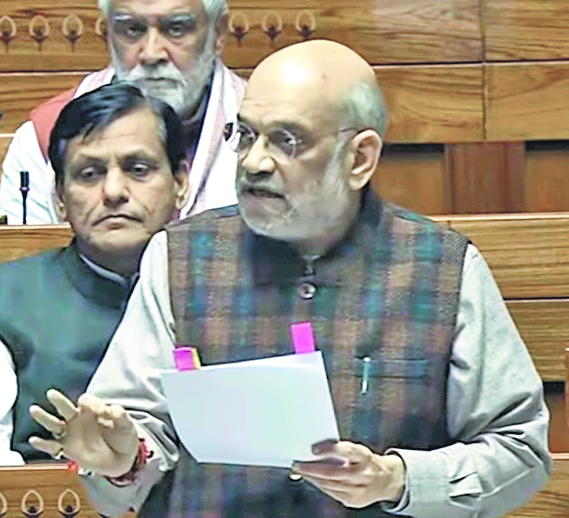The draft of new laws introduced in the Lok Sabha in place of IPC and CrPC was passed with majority on Wednesday. Presenting the amended law draft, Amit Shah said that now, the law will not be punishment-centric but victim-centric. In the new draft of the law, crimes against women, children and physical crimes have been kept respectively. Sedition law has been introduced by abolishing the section of treason.
Now any victim can go to any police station and lodge his or her FIR. This means that powerful and influential people cannot stop the FIR of crime from being registered. Apart from this, provision for EFIR has been made in the new draft. Women who are victims of rape and exploitation will especially get access to EFIR. Apart from this, the law against terrorism has been tightened in the new laws. Provisions are being made to digitise police and law and order.
In the new draft, video recording of search, seizure and statements has now been made mandatory. The police will have to do the investigation within time. The charge sheet must be submitted on time, if the police find some other evidence, then with the approval of the court, they can ask for additional time to file a supplementary charge sheet, but this period cannot exceed 180 days. Apart from this, now the trial of those who commit any kind of crime and flee abroad will be conducted in their absence and the punishment will also be given. Their properties will be confiscated.
No mercy will be shown against terrorists. At the same time, now only the one who has been punished will have the right to file mercy petition. No NGO, any institution or any other person will be able to file a mercy petition in the name of a convicted criminal. Along with this, if the criminals repent for their misdeeds, then the death penalty can be converted into life imprisonment. Life imprisonment mandates a minimum sentence of 7 years.
Earlier, Home Minister Amit Shah said on Wednesday that the new criminal law bills are in accordance with the spirit of the Constitution and have been brought keeping in mind the welfare of the people of the country.
Responding to the debate in the Lok Sabha on the Indian Judiciary (Second) Code, 2023; On the Indian Civil Defense (II) Code, 2023 and the Indian Civil Defense (II) Bill, 2023, Amit Shah said that the new laws will replace the British era laws.
“Under the leadership of Modiji, I have brought bills that emphasise Indianness, the Indian Constitution and the well-being of the people. Laws are being changed in accordance with the spirit of the Constitution.
Amit Shah said the bills will encourage the use of technology in delivering justice to the people. He said the bills include “mob-lynching” as a crime.
The minister said the British-era laws were aimed at protecting foreign rule and the new bills are people-centric.
The Lok Sabha on Tuesday discussed three bills to replace the Indian Penal Code of 1860, the Code of Criminal Procedure (CrPC) of 1973 and the Indian Evidence Act of 1872.
Amit Shah last week introduced three amended criminal law bills in the Lok Sabha that will replace the IPC, CrPC and the Indian Evidence Act.
The Home Minister withdrew three bills introduced in the Lok Sabha during the Monsoon Session of the Parliament.
He said the bills have been withdrawn and three new bills have been introduced as some changes had to be made. He said the Bills were examined by the Standing Committee and instead of coming up with official amendments, it was decided to re-introduce the Bills.
The Indian Justice (Second) Code 2023, the Indian Civil Defense (Second) Code 2023, and the Indian Evidence (Second) Bill 2023 aim to replace the IPC, CrPC, and the Evidence Act, respectively.
The earlier bills were introduced in the Lower House of the Parliament on August 11 and were referred to the standing committee.
New laws are people-centric: Shah
New Delhi: Home Minister Amit Shah on Wednesday said that the new criminal law bills are in consonance with the spirit of the Constitution and have been brought keeping in mind the well-being of the people of the country.
Replying to the debate in Lok Sabha on the Bharatiya Nyaya (Second) Sanhita, 2023; the Bharatiya Nagarik Suraksha (Second) Sanhita, 2023 and the Bharatiya Sakshya (Second) Bill, 2023, Amit Shah said that the new legislations will replace British-era laws.
“Under the leadership of Modiji, I have brought bills that lay emphasis on Indianness, the Indian Constitution and the well-being of the people. The laws are being changed in the spirit of Constitution,” he said. Amit Shah said the bills will encourage the use of technology in giving justice to people. He said “mob-lynching” had been included as an offence in the bills. The minister said the British-era laws were aimed at protecting foreign rule and the new bills are people centric.























